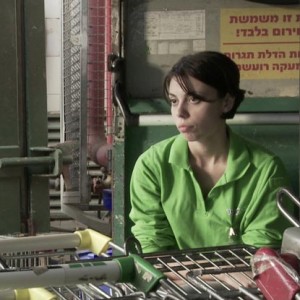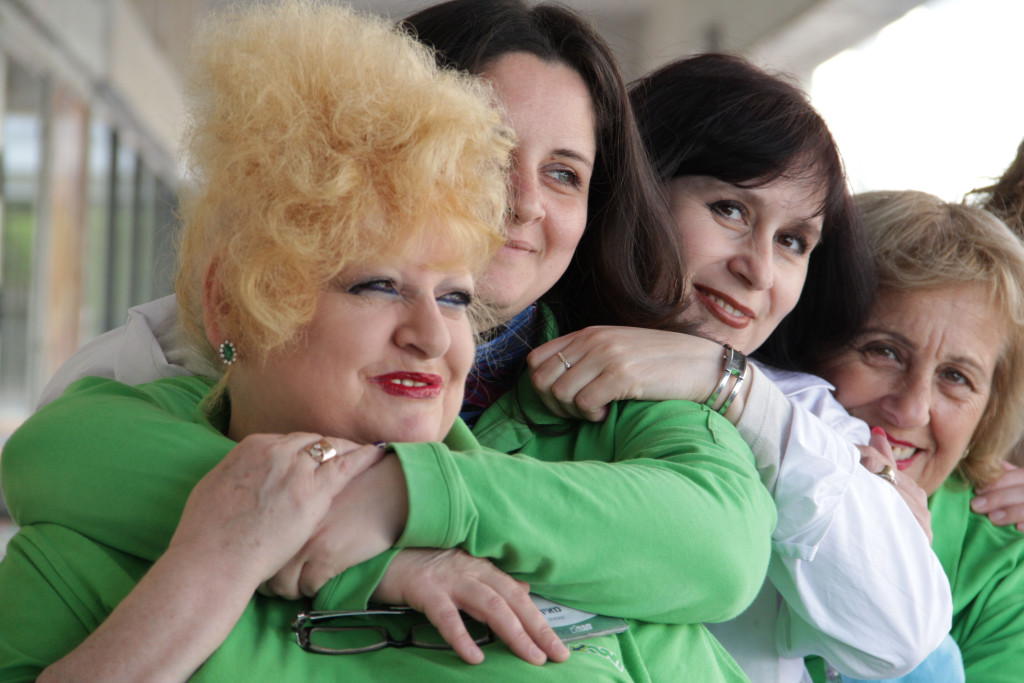By Hannah Grayson.
Yael Kipper and Ronen Zaretsky’s documentary film follows a group of cashiers as they work in a Tel Aviv supermarket. What we view is a tender portrayal of Russian and Israeli women moving through their everyday tasks and concerns. The plot contains few moments of drama, and instead our attention rests on the steady supportiveness and affectionate relationships which exist between the characters.
The experience of Russian migrants in Tel Aviv forms a common background for a number of the characters, and is the source of protagonist Yulia’s resigned realism. Leaving a destitute life in Russia after separating from her husband, she was met with equally poor conditions in Israel. Decisively avoiding further disappointment by settling for a simple life, she aims to instil the same expectations in her young son, Aharon. Kipper and Zaretsky effectively convey this simplicity in their focalisation. Scenes are largely limited to the supermarket, with stills focussing on the store room and back entrance where empty crates and waste signal both the monotony and the impermanence of the women’s employment.
 There is a tension in the film between moments of reflection and getting on with things. The weighting is heavily on the latter, but tea-breaks allow for conversations that touch on the common challenges faced by each woman: low salaries, threat of redundancy, expensive childcare, and fraught relationships. The film’s focus is on the sympathetic closeness of these co-workers and the comfort they bring to one another, rather than the problems themselves. They readily give each other advice, displaying a shared vulnerability in their struggles. As returning employee Yaniv concludes, ‘people who are in a bad place help one another’.
There is a tension in the film between moments of reflection and getting on with things. The weighting is heavily on the latter, but tea-breaks allow for conversations that touch on the common challenges faced by each woman: low salaries, threat of redundancy, expensive childcare, and fraught relationships. The film’s focus is on the sympathetic closeness of these co-workers and the comfort they bring to one another, rather than the problems themselves. They readily give each other advice, displaying a shared vulnerability in their struggles. As returning employee Yaniv concludes, ‘people who are in a bad place help one another’.
There is some longing for the past, and for home, but the overall tone of the film is only mildly nostalgic. Two snowy scenes see a girl who could be a young Yulia in Russia walking and crouching alone, and are left without context. Generally the film has the feel of a prolonged conversation, the camera comfortably occupying a merged professional and personal space. With occasional magnified perspective, soft light rests on the home scene of each co-worker in turn as we see them with their children, or in the case of Maya, applying her make-up. This scene, filmed close-up in her mirror, is emblematic of the strong female focus of the documentary, reminiscent of its title. Indeed, Nathan the supermarket manager is unquestionably an outsider, and only communicates with his unhappy staff via one employee, Nella. His thoughtless decisions to reduce hours fuel the negative portrayal of those he represents, and are overtly opposed by the cashiers. Their collective determination wins out in the final scene as they drive, defiantly not in uniform, to pursue a trade union.
A few moments grate against the otherwise steady pace of the documentary. A burst of celebratory Hannukah music and multi-coloured candles juxtapose the sad faces of the cashiers to highlight their boredom, and one incident with a rude customer provokes an angry outburst from Yulia. However, there is a prevailing display of mutual support and historical companionship, which is held in interludes of piano music, and comes in easy conversation and openness between staff. Thus, younger Ella is mothered by her older colleagues, and Yaniv is encouraged across the supermarket aisles by Yulia. In a particularly poignant scene, sadness about the losses of life in Russia is immediately punctured by humour as Maya slaps the back of Yulia who has just mis-swallowed a piece of cake. A sense of togetherness, empathy and companionship in the everyday quietly triumphs over the difficulties these women face.
 Chosen in 2013 to close the ‘Inconvenient Films’ human rights film festival in Lithuania, and for special Jury Mention at the Tel Aviv International Documentary Film Festival, Kipper and Zaretsky’s piece merits wide viewing. As Israel’s global tensions continue to occupy media attention, Super Women places the plight of immigrants and the reality of Tel Aviv’s local-global interface at the heart of contemporary documentary cinema.
Chosen in 2013 to close the ‘Inconvenient Films’ human rights film festival in Lithuania, and for special Jury Mention at the Tel Aviv International Documentary Film Festival, Kipper and Zaretsky’s piece merits wide viewing. As Israel’s global tensions continue to occupy media attention, Super Women places the plight of immigrants and the reality of Tel Aviv’s local-global interface at the heart of contemporary documentary cinema.
Hannah Grayson researches contemporary Francophone culture at the University of Warwick, where she also teaches French. Her PhD addresses how fiction responds to a number of postcolonial contexts in sub-Saharan Africa.

